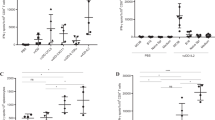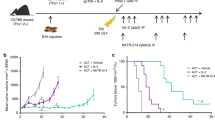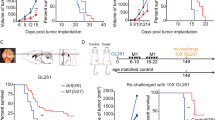Abstract
T cells recognize tumor-associated antigens under the condition of lymphopenia-induced homeostatic proliferation (HP); however, HP-driven antitumor responses gradually decay in association with tumor growth. Type I interferon (IFN) has important roles in regulating the innate and adaptive immune system. In this study we examined whether a tumor-specific immune response induced by IFN-α could enhance and sustain HP-induced antitumor immunity. An intratumoral IFN-α gene transfer resulted in marked tumor suppression when administered in the early period of syngeneic hematopoietic stem cell transplantation (synHSCT), and was evident even in distant tumors that were not transduced with the IFN-α vector. The intratumoral delivery of the IFN-α gene promoted the maturation of CD11c+ cells in the tumors and effectively augmented the antigen-presentation capacity of the cells. An analysis of the cytokine profile showed that the CD11c+ cells in the treated tumors secreted a large amount of immune-stimulatory cytokines including interleukin (IL)-6. The CD11c+ cells rescued effector T-cell proliferation from regulatory T-cell-mediated suppression, and IL-6 may have a dominant role in this phenomenon. The intratumoral IFN-α gene transfer creates an environment strongly supporting the enhancement of antitumor immunity in reconstituted lymphopenic recipients through the induction of tumor-specific immunity and suppression of immunotolerance.
This is a preview of subscription content, access via your institution
Access options
Subscribe to this journal
Receive 12 print issues and online access
$259.00 per year
only $21.58 per issue
Buy this article
- Purchase on Springer Link
- Instant access to full article PDF
Prices may be subject to local taxes which are calculated during checkout









Similar content being viewed by others
References
Rabinovich GA, Gabrilovich D, Sotomayor EM . Immunosuppressive strategies that are mediated by tumor cells. Annu Rev Immunol 2007; 25: 267–296.
Wrzesinski C, Restifo NP . Less is more: lymphodepletion followed by hematopoietic stem cell transplant augments adoptive T-cell-based anti-tumor immunotherapy. Curr Opin Immunol 2005; 17: 195–201.
Hu HM, Poehlein CH, Urba WJ, Fox BA . Development of antitumor immune responses in reconstituted lymphopenic hosts. Cancer Res 2002; 62: 3914–9391.
Dummer W, Niethammer AG, Bacccala R, Lawson BR, Wagner N, Reisfeld RA et al. T cell homeostatic proliferation elicits effective antitumor autoimmunity. J Clin Invest 2002; 110: 185–192.
Borrello I, Sotomayor EM, Rattis FM, Cooke SK, Gu L, Levitsky HI . Sustaining the graft-versus-tumor effect through posttransplant immunization with granulocyte-macrophage colony-stimulating factor (GM-CSF)-producing tumor vaccines. Blood 2000; 95: 3011–3019.
Kobayashi A, Hara H, Ohashi M, Nishimoto T, Yoshida K, Ohkohchi N et al. Allogeneic MHC gene transfer enhances an effective antitumor immunity in the early period of autologous hematopoietic stem cell transplantation. Clin Cancer Res 2007; 13: 7469–7479.
Pfeffer LM, Dinarello CA, Herberman RB, Williams BR, Borden EC, Bordens R et al. Biological properties of recombinant α-Interferons: 40th anniversary of the discovery of interferons. Cancer Res 1998; 58: 2489–2499.
Belardelli F, Ferrantini M, Proietti E, Kirkwood JM . Interferon-alpha in tumor immunity and immunotherapy. Cytokine Growth Factor Rev 2002; 13: 119–134.
Santini SM, Lapenta C, Santodonato L, D’Agostino G, Belardelli F, Ferrantini M . IFN-alpha in the generation of dendritic cells for cancer immunotherapy. Handb Exp Pharmacol 2009; 188: 295–317.
Ferrantini M, Capone I, Belardelli F . Dendritic cells and cytokines in immune rejection of cancer. Cytokine Growth Factor Rev 2008; 19: 93–107.
Hara H, Kobayashi A, Yoshida K, Ohashi M, Ohnami S, Uchida E et al. Local interferon-α gene therapy elicits systemic immunity in a syngeneic pancreatic cancer model in hamster. Cancer Sci 2007; 98: 455–463.
Hara H, Kobayashi A, Narumi K, Kondoh A, Yoshida K, Nishimoto T et al. Intratumoral interferon-α gene transfer enhances tumor immunity after allogeneic hematopoietic stem cell transplantation. Cancer Immunol Immunother 2009; 58: 1007–1021.
Narumi K, Kondoh A, Udagawa T, Hara H, Goto N, Ikarashi Y et al. Administration route-dependent induction of antitumor immunity by interferon-alpha gene transfer. Cancer Sci 2010; 101: 1686–1694.
Rodriguez EG . Nonviral DNA vectors for immunization and therapy: design and methods for their obtention. J Mol Med 2004; 82: 500–509.
Ohtani H . Focus on TILs: prognostic significance of tumor infiltrating lymphocytes in human colorectal cancer. Cancer Immunity 2007; 7: 4–13.
Garcia CA, Wang H, Benakanakere MR, Barrett E, Kinane DF, Martin M . c-Jun controls the ability of IL-12 to induce IL-10 production from human memory CD4+ T cells. J Immunol 2009; 183: 4475–4482.
Pasare C, Medzhitov R . Toll pathway-dependent blockade of CD4+CD25+ T-cell-mediated suppression by dendritic cells. Science 2003; 299: 1033–1036.
Curiel TJ, Coukos G, Zou L, Alvarez X, Cheng P, Mottram P et al. Specific recruitment of regulatory T cells in ovarian carcinoma fosters immune privilege and predicts reduced survival. Nat Med 2004; 10: 942–949.
Lai G, Zhang N, van der Touw W, Ding Y, Ju W, Bottinger EP et al. Epigenetic regulation of Foxp3 expression in regulatory T cells by DNA methylation. J Immunol 2009; 182: 259–273.
Grivennikov S, Karin E, Terzic J, Mucida D, Yu GY, Vallabhapurapu S et al. IL-6 and Stat3 are required for survival of intestinal epithelial cells and development of colitis-associated cancer. Cancer Cell 2009; 15: 103–113.
Asavaroengchai W, Kotera Y, Mule JJ . Tumor lysate-pulsed dendritic cells can elicit an effective antitumor immune response during early lymphoid recovery. Proc Natl Acad Sci USA 2002; 99: 931–936.
Morgan RA, Dudley ME, Wunderlich JR, Hughes MS, Yang JC, Sherry RM et al. Cancer regression in patients after transfer of genetically engineered lymphocytes. Science 2006; 314: 126–129.
Aoki K, Barker C, Danthinne X, Imperiale MJ, Nabel GJ . Efficient generation of recombinant adenoviral vectors by Cre-lox recombination in vitro. Mol Med 1999; 5: 224–231.
Ohashi M, Yoshida K, Kushida M, Miura Y, Ohnami S, Ikarashi Y et al. Adenovirus-mediated interferon α gene transfer induces regional direct cytotoxicity and possible systemic immunity against pancreatic cancer. Br J Cancer 2005; 93: 441–449.
Nakayama E, Uenaka A . Effect of in vivo administration of Lyt antibodies. J Exp Med 1985; 161: 345–355.
Acknowledgements
This work was supported in part by a grant-in-aid for the 3rd Term Comprehensive 10-year Strategy for Cancer Control from the Ministry of Health, Labour and Welfare of Japan, by grants-in-aid for Cancer Research from the Ministry of Health, Labour and Welfare of Japan and by the program for promotion of Foundation Studies in Health Science of the National Institute of Biomedical Innovation (NIBIO) and by Kobayashi Foundation for Cancer Research. H Hara and T Udagawa are awardees of a Research Resident Fellowship from the Foundation for Promotion of Cancer Research. We thank Vical Incorporated for providing the DMRIE/DOPE liposome.
Author information
Authors and Affiliations
Corresponding author
Ethics declarations
Competing interests
The authors declare no conflict of interest.
Rights and permissions
About this article
Cite this article
Narumi, K., Udagawa, T., Kondoh, A. et al. In vivo delivery of interferon-α gene enhances tumor immunity and suppresses immunotolerance in reconstituted lymphopenic hosts. Gene Ther 19, 34–48 (2012). https://doi.org/10.1038/gt.2011.73
Received:
Revised:
Accepted:
Published:
Issue Date:
DOI: https://doi.org/10.1038/gt.2011.73
Keywords
This article is cited by
-
Intratumoral IFN-α gene delivery reduces tumor-infiltrating regulatory T cells through the downregulation of tumor CCL17 expression
Cancer Gene Therapy (2019)
-
Pancreatic Cancer and Immunotherapy: Resistance Mechanisms and Proposed Solutions
Journal of Gastrointestinal Cancer (2019)
-
Exploiting antitumor immunity to overcome relapse and improve remission duration
Cancer Immunology, Immunotherapy (2012)



